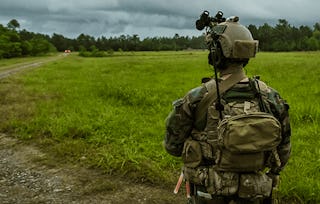Improving health care for veterans has become a matter of national attention and has gained increasing attention from the medical community. With the current surge of veterans reintegrating into civilian society it is critical to improve the training of the next cadre of providers who will provide care for our veterans. It is widely known that veterans receive care in all aspects of the health system, thus providers in veteran focused care facilities, military health serves and civilian locals must be aware of the unique needs of veterans. It is perhaps even more important to educate civilian providers who may be unfamiliar with the unique physical, mental and emotional needs related to military service.

Service Transformed: Lessons in U.S. Veteran Centered Care
6 days left! Gain next-level skills with Coursera Plus for $199 (regularly $399). Save now.

Service Transformed: Lessons in U.S. Veteran Centered Care


Instructors: Monica Lypson, M.D., M.H.P.E.
2,466 already enrolled
Included with
(17 reviews)
What you'll learn
Understand the origins of Academic Medical Centers and Veterans Administration affiliations.
Recognize and manage the influence of bias and stereotypes in patient-provider interactions.
Skills you'll gain
Details to know

Add to your LinkedIn profile
See how employees at top companies are mastering in-demand skills

There are 7 modules in this course
Unit 1 highlights the relationship between Academic Medical Centers and Veterans Health Administration and provides an overview of knowledge of the military and basic demographic of U.S. veterans.
What's included
5 videos3 readings2 assignments2 peer reviews1 discussion prompt
Unit 2 provides clear instruction on conceptual differences between determinants of health and health disparities and health care disparities; illustrate individual-based and system-based sources of health disparities for veterans.
What's included
3 videos1 reading2 assignments2 peer reviews1 discussion prompt
Unit 3 outlines the fundamental principles of patient-centeredness and cultural competence in health care, provide tools to develop self-awareness of individual assumptions, stereotypes and biases that influence the medical encounter and deliver activities that help learners acknowledge the importance of patients’ values, culture, and beliefs in improving health care.
What's included
2 videos1 reading2 assignments3 peer reviews1 discussion prompt
Unit 4 illustrates the role of empathy in health care delivery, using key experiences, concerns and perspectives of U.S. military veterans as a clinical context. This unit also describes the relationship between medical history taking and health care delivery as well as develops knowledge in areas related to military and veteran centered care.
What's included
2 videos1 reading2 assignments1 peer review1 discussion prompt
Unit 5 allows learners to use everything they have learned and apply those principles to improving assessment and triage skills for patients with post-traumatic stress disorder (PTSD) and traumatic brain injury (TBI) and identifying anxiety and depression.
What's included
2 videos1 reading2 assignments1 peer review1 discussion prompt
Unit 6 highlights the importance of partnership and collaboration across professional disciplines to enhance veteran centered to achieve optimal health.
What's included
2 videos1 reading2 assignments2 peer reviews1 discussion prompt
Unit 7 highlights the importance of partnership and collaboration across professional disciplines to enhance veteran centered care.
What's included
3 videos3 readings2 assignments1 peer review1 discussion prompt
Instructors


Offered by
Explore more from Patient Care
 Status: Preview
Status: PreviewColumbia University
 Status: Preview
Status: PreviewColumbia University
 Status: Preview
Status: PreviewColumbia University
 Status: Free Trial
Status: Free TrialUniversity of Houston
Why people choose Coursera for their career

Felipe M.

Jennifer J.

Larry W.

Chaitanya A.
Learner reviews
- 5 stars
58.82%
- 4 stars
11.76%
- 3 stars
17.64%
- 2 stars
5.88%
- 1 star
5.88%
Showing 3 of 17
Reviewed on Aug 8, 2016
Great course and one that needs more emphasis for our health providers treating veterans!
Reviewed on Dec 3, 2022
Excellent overview about the Veterans Administration and ways to navigate this huge entity.
Reviewed on Mar 29, 2018
This is a wonderful course for people who are interested in healthcare sector and for those enlisting for medical streams in the American Armed Forces.
Frequently asked questions
To access the course materials, assignments and to earn a Certificate, you will need to purchase the Certificate experience when you enroll in a course. You can try a Free Trial instead, or apply for Financial Aid. The course may offer 'Full Course, No Certificate' instead. This option lets you see all course materials, submit required assessments, and get a final grade. This also means that you will not be able to purchase a Certificate experience.
When you purchase a Certificate you get access to all course materials, including graded assignments. Upon completing the course, your electronic Certificate will be added to your Accomplishments page - from there, you can print your Certificate or add it to your LinkedIn profile.
Yes. In select learning programs, you can apply for financial aid or a scholarship if you can’t afford the enrollment fee. If fin aid or scholarship is available for your learning program selection, you’ll find a link to apply on the description page.
More questions
Financial aid available,
¹ Some assignments in this course are AI-graded. For these assignments, your data will be used in accordance with Coursera's Privacy Notice.





